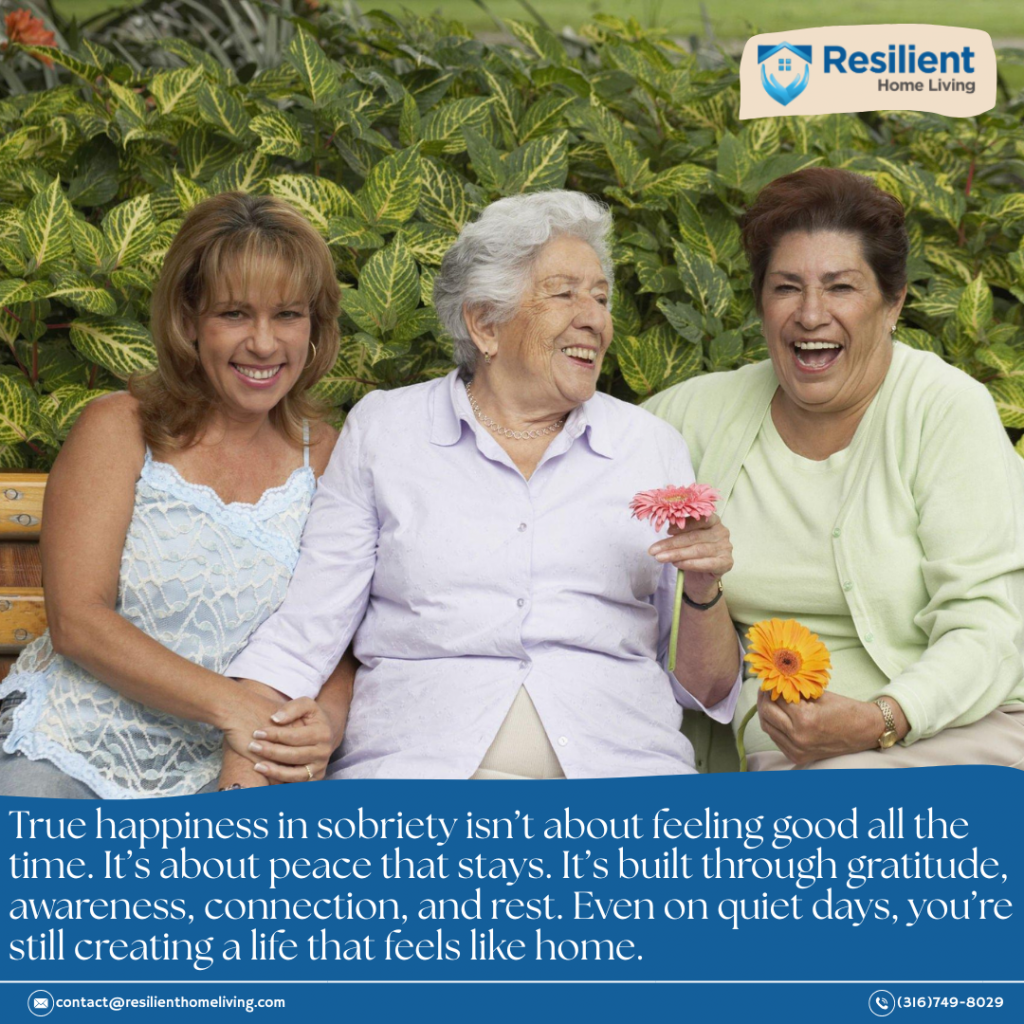When you first start your recovery journey, happiness can feel like a distant memory. You might think, “When I get through this, I’ll finally be happy again.” But one of the greatest lessons sobriety teaches is that happiness isn’t a destination — it’s a daily practice.
Sustainable happiness is not about constant excitement or a life free from struggle. It’s about peace that lasts longer than a fleeting high. It’s about creating a foundation of habits, values, and self-connection that can carry you through both calm and stormy days.
In recovery, this kind of happiness isn’t something you chase — it’s something you build.
1. Redefining Happiness
Before sobriety, happiness might have been tied to external things — parties, substances, people, or achievements. Recovery changes that definition.
Now, happiness comes from presence — being able to wake up clear-headed, to enjoy small moments, to reconnect with yourself and the world around you.
Sustainable happiness doesn’t mean life is perfect. It means you have tools and self-awareness to stay grounded when life isn’t.
Ask yourself:
- What does happiness mean to me now?
- What gives me peace that lasts longer than a moment?
- What helps me feel alive, not just distracted?
2. Building a Foundation of Routine and Purpose
Happiness thrives in structure. It’s not about rigidity, but rhythm.
Creating routines helps reduce anxiety, decision fatigue, and impulsivity — all of which can trigger stress or cravings. Consistency nurtures emotional stability, giving you the freedom to focus on joy instead of survival.
Try this:
- Morning gratitude list or meditation
- Movement — even short walks help release endorphins
- Nourishing meals and hydration
- Intentional rest (quality sleep = better mood)
Purpose also sustains happiness. Volunteering, creative projects, or mentorship can reconnect you to meaning. Purpose reminds you that your journey matters — not just for you, but for others who might be inspired by your resilience.
3. Emotional Awareness: The Heart of Sustainable Joy
One of the biggest shifts in sobriety is learning to feel again. That can be overwhelming at first — sadness, anger, and discomfort often resurface. But this emotional honesty is what makes long-term happiness possible.
True joy can’t exist without emotional depth. When you stop numbing your pain, you also open the door to genuine peace, gratitude, and love.
Practice naming emotions without judgment. Instead of labeling a day as “bad,” ask, “What emotion am I experiencing, and what is it teaching me?”
Emotional awareness helps you stay connected to yourself — which makes your happiness rooted and real.
4. Nurturing Relationships That Uplift You
Sustainable happiness often grows in connection. Recovery can shift your social circle — and that’s okay. You deserve relationships that make you feel seen, supported, and safe.
Healthy connections in recovery might look like:
- Friends who celebrate your wins and respect your boundaries
- Support groups where honesty is valued over perfection
- Family or loved ones who choose understanding over judgment
It’s also important to nurture your relationship with yourself. Be patient with your growth. Happiness grows stronger when you treat yourself with the same kindness you give others.
5. Gratitude as a Daily Anchor
Gratitude doesn’t erase pain — it balances it.
Taking a few moments each day to notice what’s good can shift your mindset from scarcity to abundance. Even small things count: a good cup of coffee, laughter with a friend, a quiet night’s sleep.
Try a daily gratitude habit:
Write down three things you’re grateful for each day — not because life is perfect, but because you’re learning to see the beauty that’s already here.
Gratitude rewires the brain for optimism, helping you stay focused on growth rather than what’s missing.
6. Letting Go of the Pressure to “Always Be Happy”
One misconception about recovery is that you’ll feel great all the time. But happiness that lasts is built on acceptance, not avoidance.
Some days will feel heavy — that’s okay. Sustainable happiness doesn’t ignore hard emotions; it coexists with them.
You don’t need to chase positivity. Sometimes, the most peaceful thing you can do is let yourself rest, cry, or simply be.
As one recovery mantra says:
“Happiness isn’t about feeling good all the time. It’s about feeling whole.”
7. Living with Intention
When you live intentionally, happiness becomes a natural outcome of alignment — not luck.
Intentional living means choosing what supports your peace, energy, and growth. It’s saying no to old patterns that steal your calm, and yes to habits that build a life you love.
Ask yourself each morning:
“What would make today feel meaningful?”
Maybe it’s showing up for a meeting, calling a loved one, cooking a meal, or simply being present. Small acts of intention create a steady current of joy that lasts.
8. The Long Game of Happiness
In early sobriety, happiness might feel inconsistent. Over time, it deepens. You begin to notice more — colors seem brighter, laughter feels fuller, and peace feels possible again.
That’s sustainable happiness: steady, rooted, and flexible enough to weather life’s ups and downs.
There will still be challenges, but now you have tools — self-awareness, emotional regulation, gratitude, and purpose. These don’t just protect your sobriety; they strengthen your capacity for lasting joy.
Remember: the goal isn’t to arrive at happiness — it’s to build a life where happiness can stay. 🌿
Final Reflection
Building sustainable happiness in recovery means embracing life as it is — imperfect, unpredictable, and incredibly beautiful.
You’ve already done something brave by choosing sobriety. That choice alone opens the door to a kind of peace and joy that substances could never give.
So keep showing up. Keep nurturing the habits and relationships that light you up. Keep reminding yourself that even on the hardest days, you’re still building something beautiful — one moment, one breath, one step at a time.

